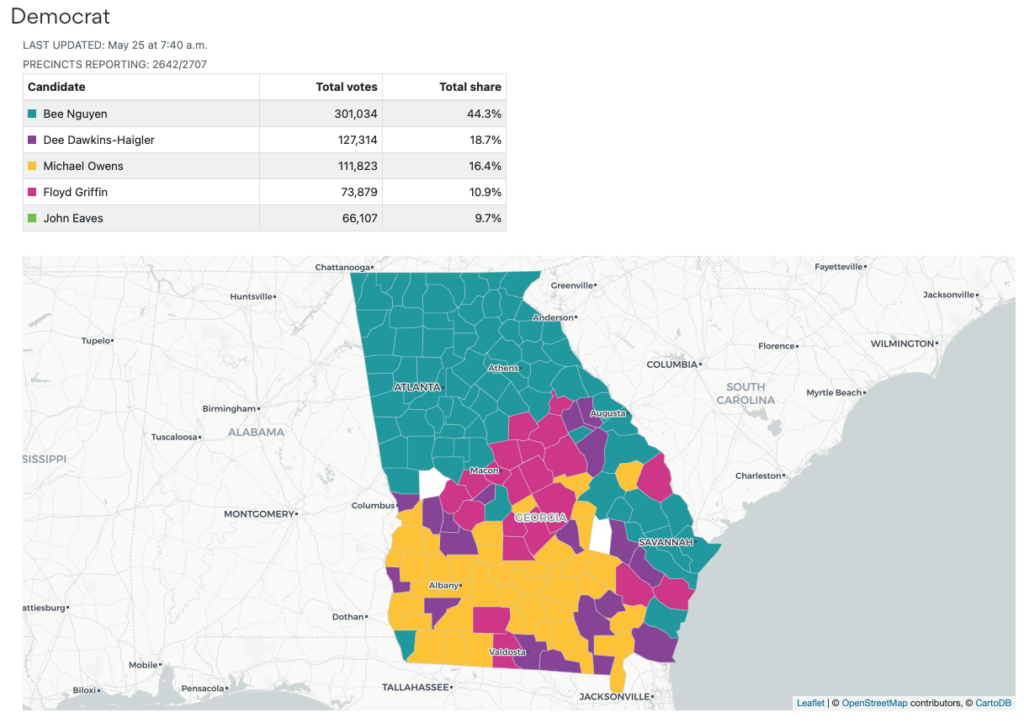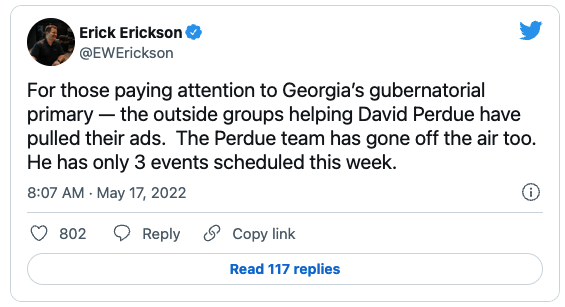About those predictions – and polling
ICYMI, yesterday I posted 5 bold predictions and the grifter in me says to tout that I’m batting .400 and that can boast a .034 better percentage than the great Ty Cobb. In reality, I got some badly wrong and others were close but not exactly right. Let’s talk about them from worst to first:
Worst Prediction: Carolyn Bourdeaux Wins
Not only was this wrong, it was embarrassingly wrong. Wishful thinking on my part because McBath is insufferable, and plainly more interested in being a Congresswoman than actually serving in Congress. However, she gets to stay and Bourdeaux gets to go back to…well, probably lobbying something I’d imagine.
Close Predictions, but still Wrong: Jake Evans doesn’t make the runoff and only the Democrat LG race goes to a runoff
Let’s start with the CD6 race. McCormick missed winning outright by about 7% with a total of nine candidates in the race. Not bad performance, and one that mirrors his performance in CD7 in 2020. That can’t mean good things for Jake Evans, but the boost from the endorsement did do enough to make up that 7%. Neither candidate justifiably should be there, but they are. So, close on this one but wrong.
The more notable races were on the Democrat side. Bee Nguyen essentially self-appointed herself the only person capable of beating the GOP in November for Secretary of State, something the Democratic apparatus apparently agreed with. Her list of establishment Democrat endorsements is notable. This includes Fair Fight, which means that she’s explicitly the choice of Stacey Abrams to be on the ticket. 44% of the vote is nothing shabby, but to have all that infrastructure behind you and still only pull that has to be worrying. And, as mentioned in my predictions yesterday, in a party obsessed with personal categorization, one wonders if that will come into play. The map of the results at least suggests that Nguyen might be somewhat susceptible to an upset here.

Absolutely Correct Predictions: Kemp receives over 70% and Raffensberger wins without a runoff
The pollsters are bupkiss. I knew it, and I’ll tell you why here in a few paragraphs. Granted, I’m a Republican grifter so my prognostications about the Democrat races were a bit more “throw darts and see if I hit something,” but these I’d have bet money on.
Kemp won with over 73% of the vote, and that gave me a cushion of about 35,000 votes to get this one right. All the signs were there. Erick Erickson reported that Perdue essentially pulled all spending a week before the election. Perdue’s campaign was sputtering from the start, and he jumped on a ship that sailed a long time ago to secure Trump’s blessing. Not to mention that the Kemp campaign planned for this eventuality anyway and absolutely campaigned like he was 10 points down the whole time. Honestly, I don’t know why more people wouldn’t have seen this.

The other prediction was the furthest one out there, but dammit if I didn’t nail that one, too. The voters that powered Raffensberger tended to be a bit younger and conservative, but not necessarily MAGA. Think of these voters as Presidential Preference voters – guaranteed to vote in the general, not likely to vote in general primaries – and you see a lot of fragmentation as a result. Remember in 2016, Trump did take a sizable contingent of the preference vote at 39%, but Cruz and Rubio combined took 49%. That’s not to say those voters weren’t happy to vote for Trump in the general – which they did – or displeased enough to seek greener pastures in 2020 – which they didn’t – but it also doesn’t mean that they’re loyalists. That they came out this election is a testament to that fragmentation and to where Trump’s grip actually lies (with the grifters in Washington vis-a-vis the vocal, but small, party activist contingent).
So, why is polling so bad?
The answer is because pollsters are horrible at developing sampling methodologies that work, especially in a shifting primary landscape that has seen drastic changes of who is actually voting. The best pollster in Georgia still got it wildly wrong last night. His poll had Kemp at 60% with about 4% undecided; he had Hice and Raffensberger neck and neck with Hice having about a 2% lead with 10% undecided.
Here are some things about polls that you have to understand:
- Polls are only as good as the sampling methodology: There is no reason to discount the results of polls when they’re reported as being “wrong” on face. They, more than likely, accurately present the data that was collected from whom it was collected. The problem is who the data points were collected from, and that’s where these polls fell short. The sample of 500 voters fell entirely short.
- Good polls will tell you the methodology of how data was collected and to what proportion each method was used: Polls that don’t tell you how many respondents were collected by IVR, online, cell phone, and other methods aren’t giving you enough information to trust the results. IVR polls cannot contact people on cell phones. Online can be precipitated with text messages, so you miss people with landlines. There are a number of ways to balance out these various shortcomings, and a good poll will tell you how they did that.
Polling is statistics, and a good statistician will always tell you the assumptions that went into collecting the data being analyzed. Methods are fundamental to good statistical collection and data analysis, something that polling is just horribly lacking right now. The few polls we saw come out in this race were either tainted by outright bias (think Insider Advantage) or lacked good sampling methods (think the polls above). Given the nature of our infotainment industry, where headlines drive advertising revenues, horse race polls that give people something to talk about are more meaningful to the bottom line. You can’t really blame service providers – pollsters – for providing an in-demand service, too.
However, it’s ruining our political discussions.
